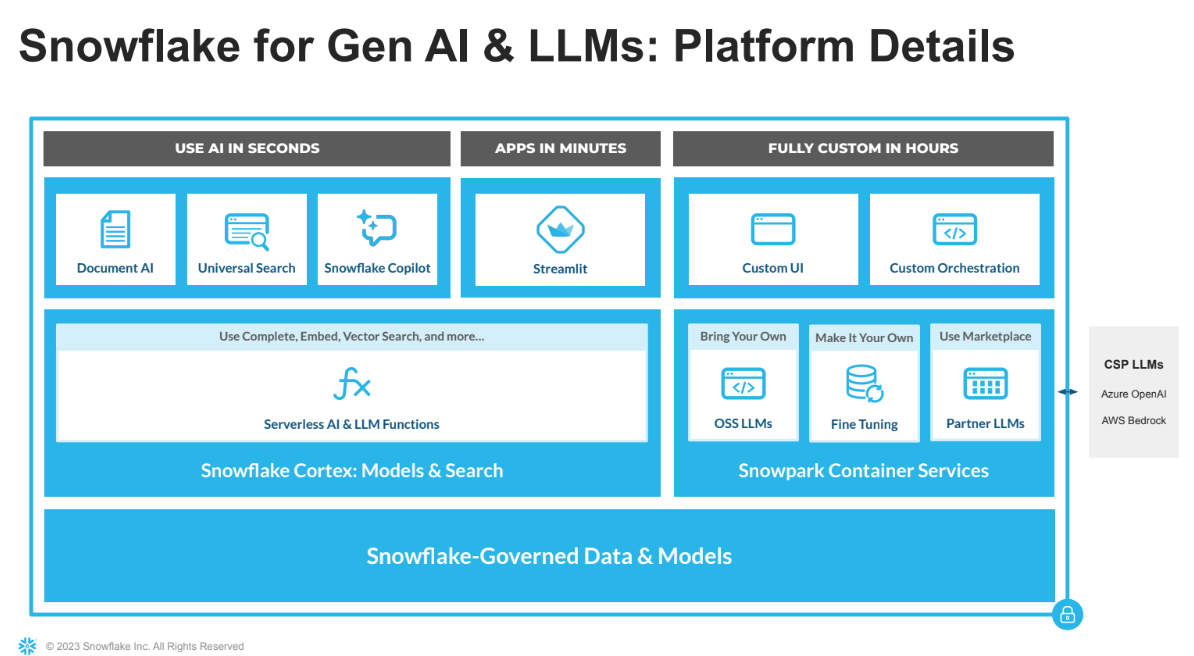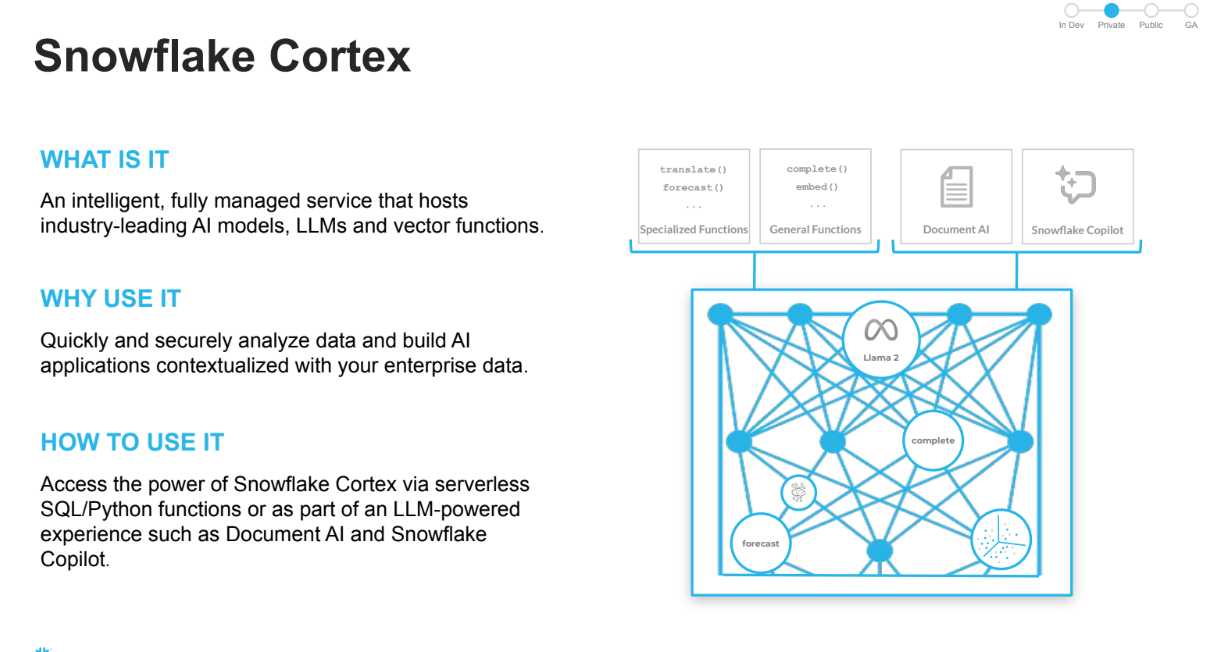Snowflake lays out AI managed service vision with Cortex
Snowflake consolidated its AI and machine learning efforts with Snowflake Cortex, a managed service that provides access to large language models (LLMs), AI models and vector search in one place and includes Snowflake Copilot, Document AI and Universal Search.
Cortex, announced at Snowflake's Snowday developer conference, is in private preview. Snowflake Cortex will include LLMs including Meta's Llama 2 model as well as task-specific models. For Snowflake, the move to Cortex highlights a vision that revolves around providing AI building blocks without expertise or GPU infrastructure management.

To go with Cortex, Snowflake expanded its Snowflake Horizon built-in governance platform. The company added data quality monitoring, data lineage UI, differential privacy policies, enhanced classification of data and an upcoming Trust Center that will streamline cross-cloud security and compliance modeling.
Snowflake also plans to provide a cost management interface so admins can manage costs in Snowflake.
Related: Snowflake Q2 better than expected | Snowflake launches Snowpark Container Services, linchpin to generative AI strategy | Snowflake, Nvidia team up to enable custom enterprise generative AI apps
Although the announcements are notable for Snowflake customers, it's worth noting that many of these services are in private preview.
Doug Henschen, Constellation Research analyst, provided his take on Snowflake's barrage of announcements and private previews. He said:
"Snowflake is making lots of private preview announcements. Snowflake's general pattern is to make more "heads up it’s coming" announcements during Snowday and more "it's now public preview or GA" at Snowflake Summit in June, but I don't tend to get too get excited about private preview announcements that are six to 12 months from being available to customers.
Horizon and Cortex are, indeed, two of the higher-profile announcements. Horizon is really consolidating everything Snowflake already has and has planned in the way of metadata management, cataloging and governance. It’s partly a response to competitors, like Databricks and Google, that have put cataloging at the forefront with their Unity Catalog and Dataplex offerings, respectively. Snowflake already had a catalog and multiple governance capabilities, but they’re now pulling everything together under the Horizon umbrella and providing a clearer and more comprehensive vision of what’s ahead. Cortex is entirely in private preview but, here too, we're seeing the vision for how GenAI and more conventional AI/ML will be made available on the Snowflake platform."

Research:
- Google Sets BigQuery Apart With GenAI, Open Choices, and Cross-Cloud Querying
- Constellation ShortListâ„¢ Self-Service Data Science & Machine Learning
- How Data Catalogs Will Benefit From and Accelerate Generative AI
- Analytics and Business Intelligence Trends in Cloud, Embedding, and Generative AI
- Constellation ShortListâ„¢ Automated Cloud Data Warehouse Services
Instead, Henschen said Snowflake customers should focus on things that are closer to launch. Snowflake announced the following additions that are closer to prime time.
- Snowpark ML Modeling API, which will be generally available soon, will give developers and data scientists tools to simplify model training faster.
- Snowpark Model Registry, public preview soon, will have expanded support for models from Hugging Face.
- Snowflake Native App Framework, generally available on AWS soon and in public preview soon on Microsoft Azure.
- Snowflake Container Services, public preview in select AWS regions.
- Support for Iceberg Tables, which will be in public preview soon.
Henschen said Snowflake customers need to focus on what's coming within weeks more than months. He added:
"The standouts for me are the things that are entering public preview or that will soon be generally available. Support for Iceberg Tables, for example, is now in public preview, and it promises interoperability of data managed in Snowflake for open access and usability of data for other workloads and applications. It’s a win for customers. Another example is the Snowpark ML Modeling API, which will enable the many customers using Snowpark to more easily tap into Snowflake data for model preprocessing and training. Similarly, the Snowpark Model Registry, which is going into public preview, will improve support for ML OPS within Snowflake."
The biggest takeaway from Snowflake's Snowpark conference is that the company is consolidating its efforts to provide a unified platform. Snowflake's core themes at Snowpark were to simplify the data foundation, accelerate AI adoption and scale applications.
"It's a good set of announcements, but with so many elements being in private preview, my sense is that both Databricks and Google are ahead of them on having ML/AI and GenAI capabilities internally within the platform and in supporting customers who want to develop their own ML/AI and GenAI capabilities. I’d like to see either a shorter lag time between private preview and public preview stages or a shift by Snowflake towards only announcing capabilities that are nearly ready for public preview. There are capabilities, like Unistore, for example, that were announced at Snowflake Summit 2022 that still aren’t available. In my opinion it’s not a good idea to announce things unless they’ll definitely be available within six to eight months."

